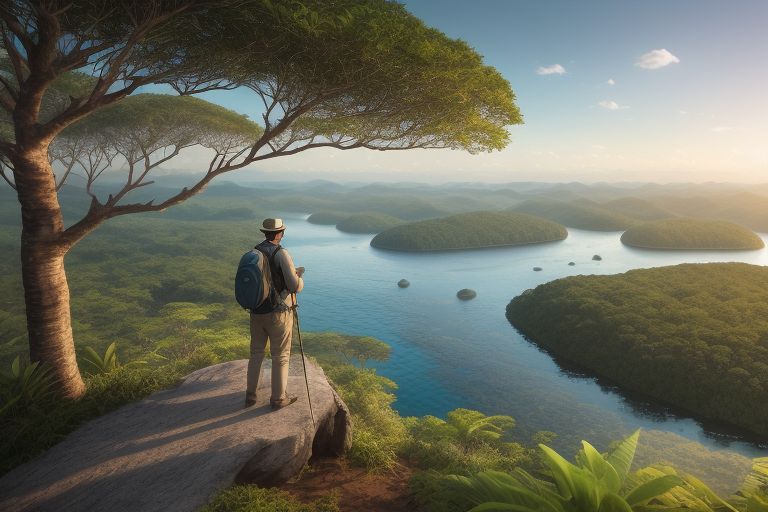In a world increasingly dominated by technology and urbanization, the allure of nature’s untouched beauty is more compelling than ever. Eco-friendly wilderness adventures offer a unique blend of exploration and conservation, allowing travelers to immerse themselves in breathtaking landscapes while contributing to the preservation of biodiversity and sustainable habitats. This article delves into some of the most fascinating natural wonders and eco-friendly adventures around the globe, highlighting expert insights, recent discoveries, and cultural anecdotes that enrich the experience.
1. The Enchanting Amazon Rainforest
The Lungs of the Earth
The Amazon Rainforest, often referred to as the “lungs of the Earth,” is a biodiversity hotspot teeming with life. Covering over 5.5 million square kilometers, it houses approximately 10% of all known species on the planet.
“The Amazon is not just a forest; it’s a vast mosaic of ecosystems, each with its own unique flora and fauna. Protecting it is crucial for maintaining global biodiversity,” says Dr. Carlos Peres, a leading tropical ecologist.
Eco-Tourism and Conservation
Eco-tourism in the Amazon provides a sustainable alternative to deforestation and illegal logging. Lodges like the Napo Wildlife Center in Ecuador offer immersive experiences while ensuring minimal environmental impact. Visitors can explore the jungle on guided tours, observe wildlife from canopy towers, and engage with local indigenous communities.
Cultural Anecdotes: The Wayuu People
The Wayuu people, indigenous to the Amazon, have a deep connection to the rainforest. Their traditional knowledge and sustainable practices offer valuable insights into living harmoniously with nature. Participating in a Wayuu-led tour not only supports their community but also enriches the travel experience with cultural depth.
2. The Great Barrier Reef: Underwater Wonderland
A Marine Marvel
The Great Barrier Reef, the world’s largest coral reef system, is a UNESCO World Heritage site and one of the seven natural wonders of the world. Spanning over 2,300 kilometers, it boasts an extraordinary diversity of marine life.
“The Great Barrier Reef is an irreplaceable ecosystem. Its conservation is essential for maintaining marine biodiversity and the health of our oceans,” emphasizes Dr. Emma Camp, a marine biologist specializing in coral reef resilience.
Sustainable Diving Adventures
Eco-conscious dive operators like Wavelength Reef Cruises offer sustainable diving and snorkeling experiences. These tours educate participants on reef conservation, promote responsible diving practices, and contribute to ongoing marine research.
Cultural Anecdotes: The Aboriginal Connection
For the Aboriginal people of Australia, the Great Barrier Reef is a sacred site. Stories of creation and ancestral spirits are interwoven with the reef’s existence. Engaging with Aboriginal guides provides a deeper understanding of the reef’s cultural significance and the indigenous perspective on environmental stewardship.
3. The Serengeti: A Symphony of Life
The Endless Plains
The Serengeti, stretching across Tanzania and Kenya, is famed for its annual migration of over 1.5 million wildebeest and hundreds of thousands of zebras and gazelles. This natural spectacle is a testament to the resilience and interconnectedness of ecosystems.
“The Serengeti’s migration is one of nature’s most awe-inspiring events. Protecting this area ensures the survival of numerous species and the balance of the savanna ecosystem,” notes Dr. Grant Hopcraft, a wildlife ecologist.
Eco-Safaris and Wildlife Conservation
Eco-friendly safari operators like Singita Grumeti provide luxury experiences while prioritizing conservation. These safaris support anti-poaching efforts, community development, and habitat restoration projects. Guests can witness the grandeur of the migration and participate in conservation activities.
Cultural Anecdotes: The Maasai Warriors
The Maasai people, renowned for their vibrant culture and traditional attire, play a crucial role in the Serengeti’s conservation. Their sustainable herding practices and deep respect for wildlife offer a model for balancing human needs with environmental protection. Visiting a Maasai village offers a glimpse into their way of life and their efforts to preserve the Serengeti.
4. Patagonia: The Untamed Wilderness
The Land of Extremes
Patagonia, a region shared by Argentina and Chile, is a land of stark contrasts and breathtaking landscapes. From towering glaciers to vast steppes, Patagonia’s natural beauty is unparalleled.
“Patagonia’s unique ecosystems are a refuge for numerous species and a testament to the power of nature’s resilience,” states Dr. Adriana Hoffmann, a botanist and environmental activist.
Eco-Adventures in Patagonia
Eco-friendly tours in Patagonia, such as those offered by EcoCamp Patagonia, emphasize sustainable practices and environmental education. Activities include trekking in Torres del Paine National Park, wildlife spotting, and glacial explorations, all designed to minimize environmental impact.
Cultural Anecdotes: The Tehuelche Legacy
The Tehuelche people, indigenous to Patagonia, have a rich history and cultural heritage intertwined with the land. Their traditional knowledge and respect for nature continue to influence conservation efforts in the region. Engaging with Tehuelche descendants provides valuable insights into the historical and cultural significance of Patagonia’s landscapes.
5. Borneo: The Heart of Biodiversity
A Tropical Treasure
Borneo, the third-largest island in the world, is renowned for its dense rainforests and incredible biodiversity. It is home to unique species such as the orangutan, pygmy elephant, and proboscis monkey.
“Borneo’s rainforests are a treasure trove of biodiversity. Protecting them is critical for the survival of many endangered species,” asserts Dr. Marc Ancrenaz, a wildlife biologist specializing in orangutan conservation.
Responsible Wildlife Tourism
Organizations like the Borneo Orangutan Survival Foundation offer eco-tourism experiences that support conservation. Visitors can participate in orangutan rehabilitation programs, explore the rainforest with expert guides, and learn about ongoing efforts to combat deforestation.
Cultural Anecdotes: The Dayak Traditions
The Dayak people, indigenous to Borneo, have a profound connection to the forest. Their traditional practices and beliefs emphasize harmony with nature and the sustainable use of resources. Participating in a Dayak cultural experience provides a deeper appreciation for Borneo’s natural and cultural heritage.
6. The Galápagos Islands: Evolution’s Laboratory
A Living Museum
The Galápagos Islands, an archipelago in the Pacific Ocean, are famous for their unique wildlife and pivotal role in Charles Darwin’s theory of evolution. The islands are a living laboratory of natural history and biodiversity.
“The Galápagos are a testament to the wonders of evolution. Their protection is vital for preserving this natural heritage,” says Dr. Jane R. Powell, a marine ecologist.
Sustainable Tourism Practices
Eco-tourism in the Galápagos is carefully regulated to minimize impact on the fragile ecosystems. Operators like Ecoventura offer small-ship cruises that adhere to strict environmental standards. Activities include guided wildlife tours, snorkeling, and educational programs.
Cultural Anecdotes: The Legacy of Darwin
The legacy of Charles Darwin is deeply ingrained in the Galápagos. Visiting the Charles Darwin Research Station provides insights into the ongoing research and conservation efforts inspired by his work. Engaging with local guides offers a unique perspective on the islands’ historical and scientific significance.
7. The Himalayas: Roof of the World
Majestic Peaks
The Himalayas, home to the world’s highest peaks including Mount Everest, are a natural wonder of immense scale and beauty. The region’s diverse climates and altitudes support a wide range of ecosystems.
“The Himalayas are not just mountains; they are a sanctuary for biodiversity and a source of life for millions,” highlights Dr. Kamal Bawa, a conservation biologist.
Eco-Trekking Adventures
Eco-trekking in the Himalayas, such as the initiatives by the International Centre for Integrated Mountain Development (ICIMOD), promotes sustainable tourism practices. Treks focus on minimizing environmental impact, supporting local communities, and preserving the natural landscape.
Cultural Anecdotes: The Sherpa Heritage
The Sherpa people, indigenous to the Himalayas, are renowned for their mountaineering skills and deep spiritual connection to the mountains. Their sustainable practices and knowledge of the terrain are invaluable for eco-trekking initiatives. Participating in a Sherpa-led trek provides an authentic and respectful engagement with the Himalayas.
8. Costa Rica: Pura Vida Paradise
Biodiversity Hotspot
Costa Rica, a small Central American country, is celebrated for its rich biodiversity and commitment to conservation. It contains 5% of the world’s biodiversity despite covering only 0.03% of the Earth’s surface.
“Costa Rica’s commitment to conservation and sustainable tourism is a model for the world. Protecting its natural heritage is essential for future generations,” emphasizes Dr. Eduardo Carrillo, a conservation biologist.
Eco-Lodges and Sustainable Tourism
Eco-lodges in Costa Rica, such as Lapa Rios Lodge, offer luxurious yet sustainable accommodations. Activities include guided rainforest tours, birdwatching, and participation in conservation projects. These lodges are designed to minimize environmental impact and support local communities.
Cultural Anecdotes: The Pura Vida Philosophy
The phrase “Pura Vida,” meaning “pure life,” encapsulates Costa Rican culture and its emphasis on living in harmony with nature. Engaging with local communities and participating in cultural activities provides a deeper understanding of the Pura Vida lifestyle and its connection to environmental stewardship.
A Call to Explore and Conserve
Exploring Earth’s natural wonders through eco-friendly wilderness adventures offers not only a profound connection to nature but also an opportunity to contribute to its preservation. By supporting sustainable tourism and engaging with local cultures, travelers can help protect these precious ecosystems for future generations. Each journey into the wild is a step towards a more sustainable and biodiverse planet.
In the words of John Muir, “In every walk with nature, one receives far more than he seeks.”





